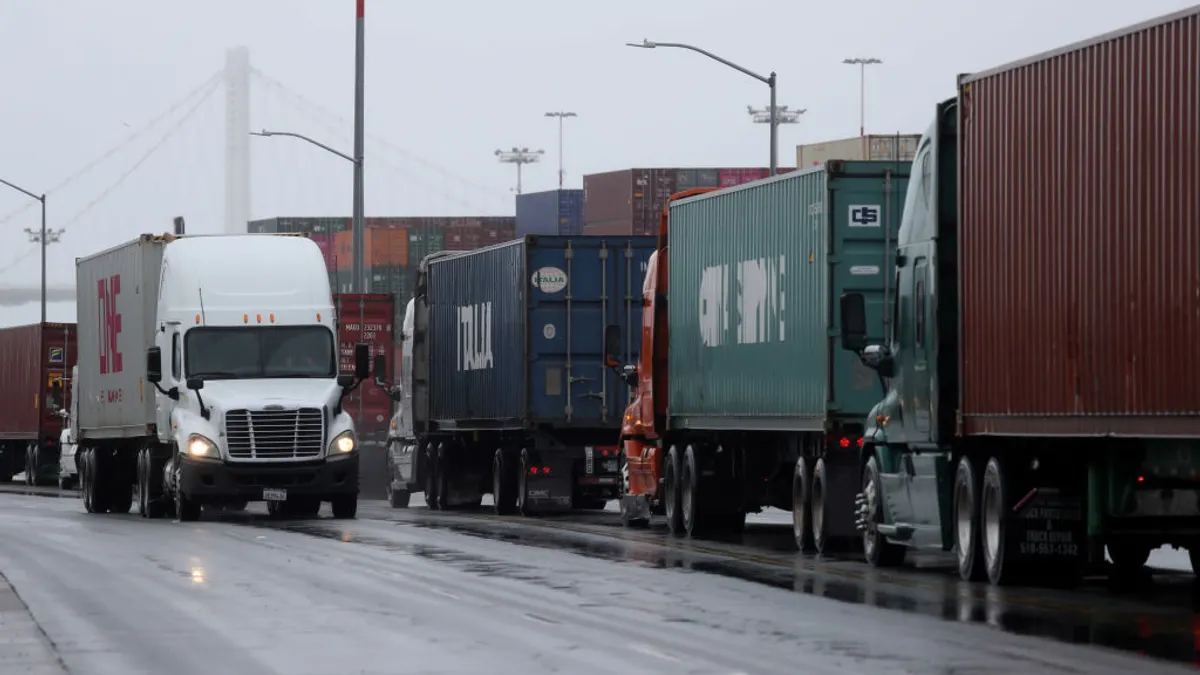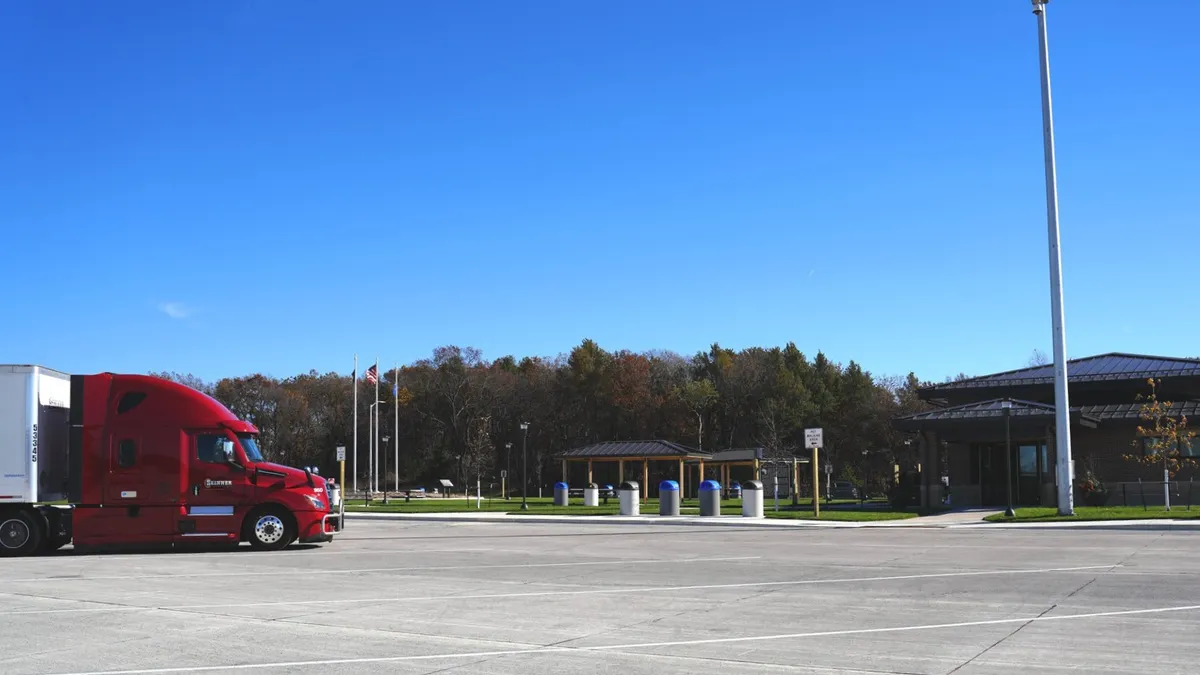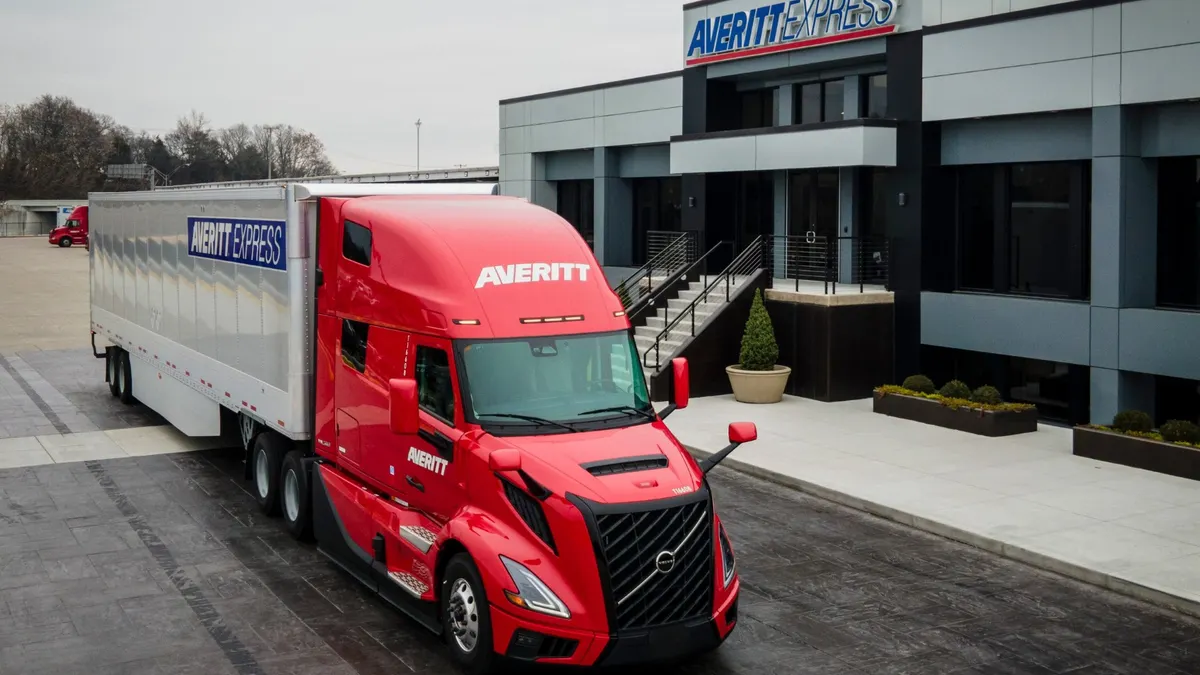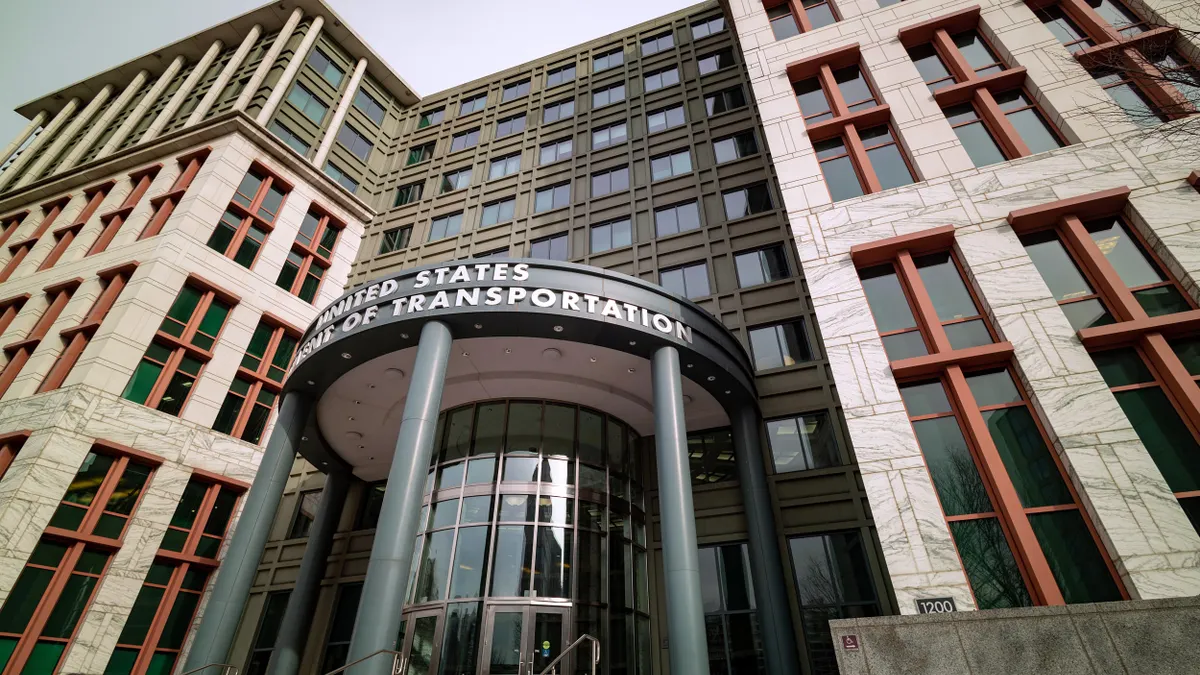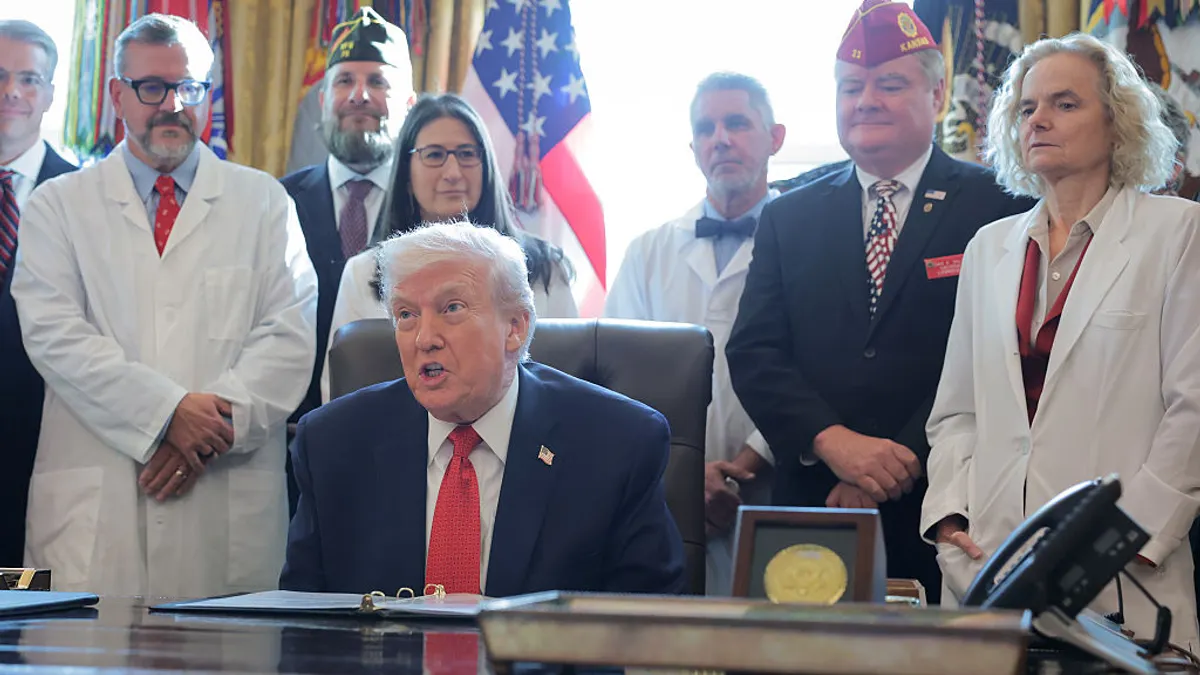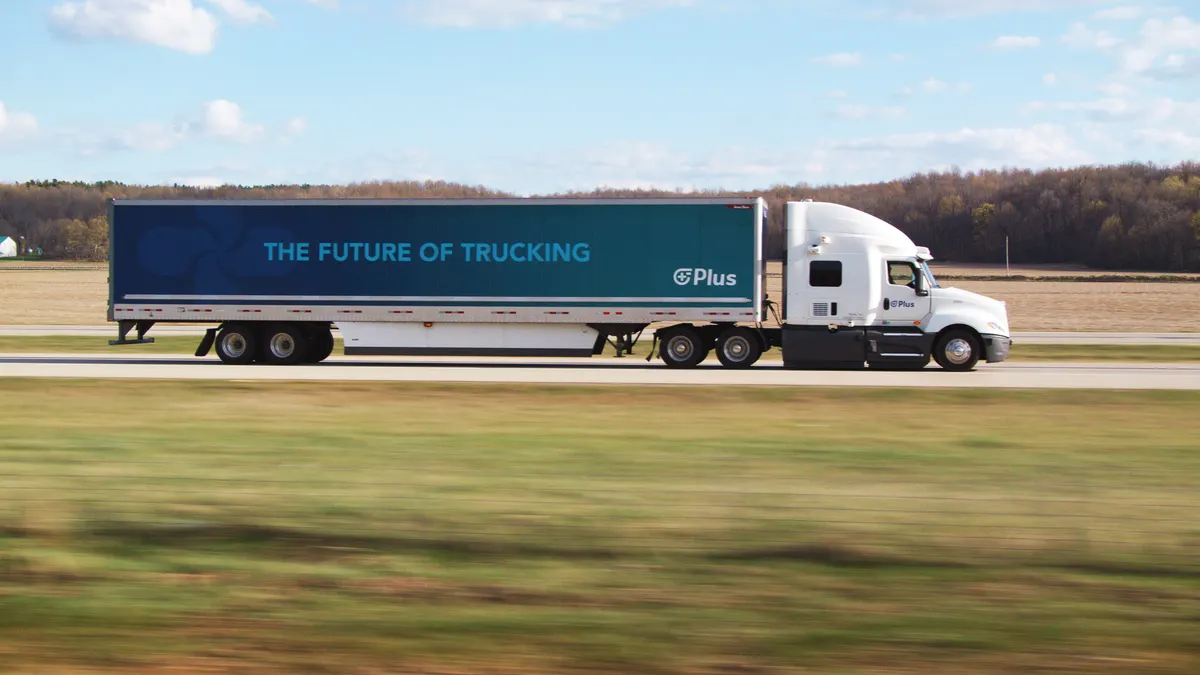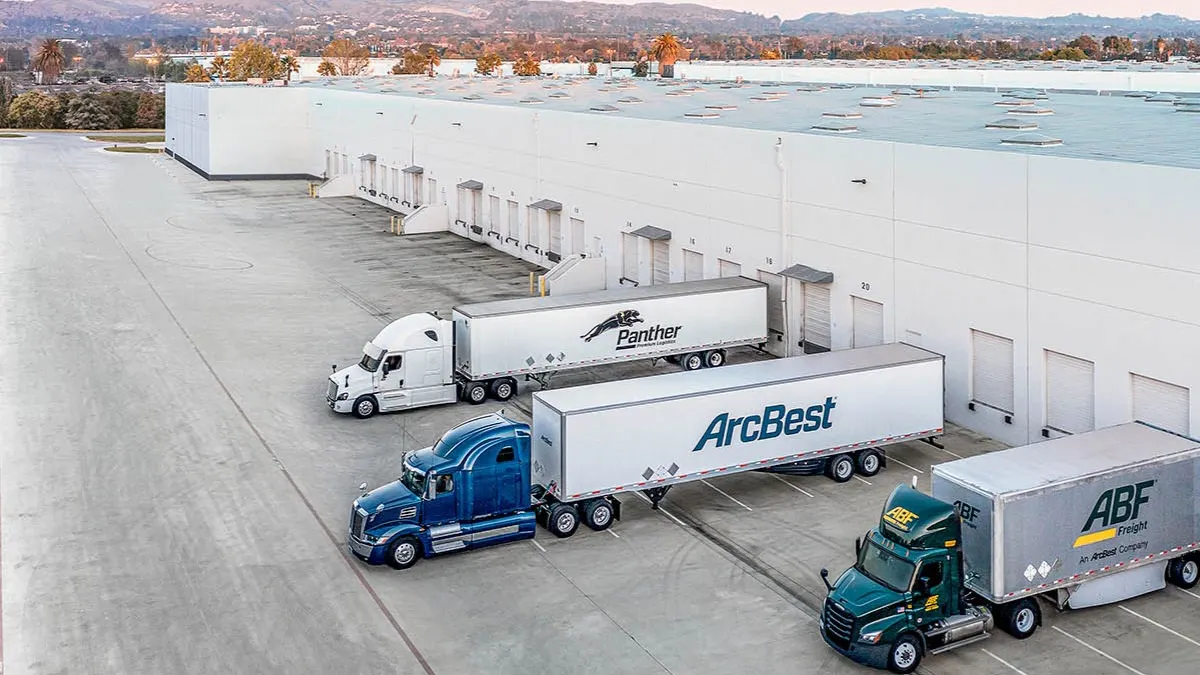In late February, as COVID-19 began to spread across the United States, Tennessee-based carrier U.S. Xpress started reconfiguring its driver training methods and procedures.
U.S. Xpress offered new recruits airline tickets or rental cars to one of the six training centers, not the usual bus ticket, according to Matt Herndon, U.S. Xpress COO. Orientation classes, usually about 30 people in one day, were spread out over the week to increase social distancing. A number of other classes were shifted online, Herndon told Transport Dive.
One thing that didn't change was demand, Herndon said. The same number of recruits have been flowing in, although transfers from other carriers are not as common, he said. U.S. Xpress has about the same number of trucks on the road — about 7,000 — as it did before the COVID-19 crisis. Herndon chalked up his truckload company's current strength to having a lot of retail clients. Its clients are the ones hit by demand for food and medical products, or ones queried often by e-commerce search engines.
"We still have customers coming to us needing capacity," said Herndon.
Demand, spiked by panic buying and restocking, has meant the turbulent times of COVID-19 have given no rest to fleets from the crucial task of recruiting and training drivers. It's a mission that remains, even as state governments ask some learning institutions to temporarily close.
A major driver-training school system, Roadmaster Drivers School, has 14 U.S. locations. So far, only one school of 14 run by Roadmaster is closed. It's in Bethlehem, Pennsylvania. Roadmaster officials could not be reached for comment.
Training goes online
Demand is rising for distance-learning or online-teaching companies, such as Instructional Technologies Inc. (ITI). Laura McMillan, vice president of ITI's training program development, said carriers are increasingly looking to move more parts of training online.
"For carriers who are hiring ... there's a broad online need for training," McMillan told Transport Dive.
ITI offers drivers online training for heavy-duty trucks, with some courses for lighter trucks and final-mile vehicles. Since the COVID-19 crisis began spreading in mid-February, McMillan said fleets have been asking for a wider range of new services that cover orientation, onboarding and health-related matters. The main goal is to keep trainees away from groups and classrooms. But fleets also want trainees and drivers to be up-to-date on COVID-19.
"There's been a need to keep everyone current," said McMillan.
One thing that cannot be altered is the need for physical testing for the commercial driver's license (CDL). "Naturally, you cannot do everything online," said Herndon. "They still have to pass and take a physical road test."
"There's a broad online need for training."

Laura McMillan
Vice president of training program development, ITI
Training on the road also continues, with a trainer taking a new recruit out on the road for four to six weeks, Herndon said.
To assure its employees about safety, U.S. Xpress has adopted questionnaires about fever, contacts with infected people, symptoms and more. The company is considering taking temperatures of employees.
Herndon said some shippers and warehouses query drivers too. One such warehouse company is Americold, which told Transport Dive that drivers are required to fill out a screening questionnaire to identify any recent illnesses and travel that may affect its business.
The only change Herndon said he can think of in recruitment is that existing drivers employed by rivals are putting off changing companies, likely because the drivers want to see what happens in the next few months.
Virtual tours for recruits
UPS told Transport Dive its current hiring needs are relatively flat, with some areas of the country tighter than others.
"In general, we are only hiring where attrition is a factor — students graduating and moving on from our part-time positions or retirements in the full-time driving ranks," said Glenn Zaccara, UPS spokesman.
"We're continuing to move forward with job opportunities at UPS while making modifications to the recruitment process."

Glenn Zaccara
UPS spokesman
The overall numbers on the need for new drivers during the COVID-19 crisis are mixed. Tenstreet, which offers driver recruiting software and consulting services, wrote on its company blog that for the week ended March 23, the company said it observed "consistent, albeit minor declines in processing activity, continuing a downward trend consistent with the macro stories around the economic pullback from the various stay at home orders across the country."
But when the coronavirus problem dissipates, carriers will have to grapple anew with the driver shortage. It's a problem the American Transportation Research Institute, the research arm of the American Trucking Associations, says is the No. 1 issue in the industry The U.S. Bureau of Labor Statistics' website says slots for Class 8 drivers will see a 5% increase from 2018 to 2028.
The coronavirus situation has thrown curves at the hiring and onboarding process. It has led UPS to stress safety early in the recruitment process of all employees and customers, Zaccara said.
"While we closely monitor the impact of the novel coronavirus, our highest priority remains the health and safety of our employees, customers, suppliers, and candidates," Zaccara told Transport Dive in an email. "We're continuing to move forward with job opportunities at UPS while making modifications to the recruitment process."
Candidates selected for an interview for a UPS opportunity can use digital or other remote capabilities throughout the recruitment process, Zaccara said. This may include remote interviews via video or phone. UPS can also share a link with candidates to provide a virtual tour of a facility, Zaccara said.
A new challenge for fleets
Industry officials are working to figure out how to handle COVID-19 and help drivers get through it. "It's unfortunate we even had to deal with the issue," McMillan said. She said ITI was tasked with coming up with an online video that addressed avoidance of COVID-19 and other bugs. The lesson used layman's language to stress CDC hand-washing and other guidelines, she said.
McMillan said another COVID-19 lesson that ITI had to stress in its 10-minute video was the avoidance of a particular driving distraction: Coronavirus worries could have drivers distracted.
"The lesson discusses the need to minimize distractions. They're human beings," McMillan said. "Keep your focus on the road."




